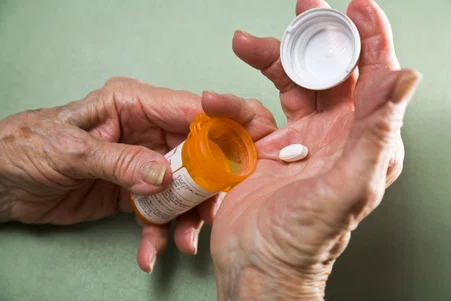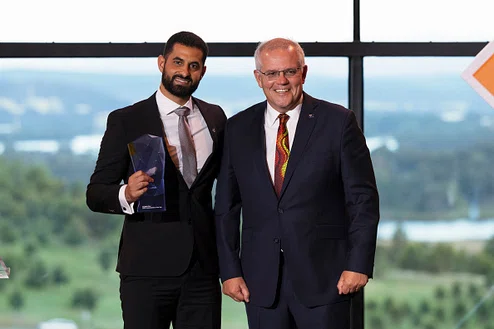Dr Daniel Nour has been named the 2022 Young Australian of the Year for his selfless work creating mobile homeless medical service, Street Side Medics.
At just 26-years-old, the resident doctor saw a major gap in NSW health services, prompting him to launch the not-for-profit in August 2020.
With 145 volunteers and four clinics across NSW, the service provides medical assistance to those experiencing homelessness. It has so far helped an estimated 300 people, treating a range of illnesses many of which would otherwise have gone unnoticed. The service is completely free and doesn’t require a Medicare card.
“As we sit here tonight there are over 116 thousand Australians who are experiencing homelessness,” Dr Nour said in his acceptance speech.
“Unfortunately, many of these Australians face significant barriers that limit their ability to access the healthcare services that we are all so lucky to have available to us.
“As a result of this they suffer in silence, many die of conditions which could have been treated and avoid interventions which could have improved quality of life.”
Dr Nour added that it had been difficult journey, however the thought of Australians suffering from medical conditions that could be treated kept him going. He said plans were to take the service national to help more of those living on the streets.
Dr Nour’s leadership and social consciousness have seen him make significant contributions to Australian society, earning him the title of Young Australian of the Year for 2022.
The Australian, 22 February 2022
Before her kids’ routine was blown up by the pandemic in March 2020, Sarah Sweeney had much in common with other parents keen to provide their children with enriching extras.
‘‘Every night, 5pm to 8pm, Sunday to Friday, we had some sort of extracurricular activity,’’ says Sweeney, who like her husband, works full-time. ‘‘It was AFL three days per week or soccer two days per week for my son, Hugo, or, for my daughter, Charlotte, netball three days per week, tennis two days per week and dancing (tap, jazz, ballet and hip-hop) two days a week’’.
By the time COVID-19 hit, ‘‘we were all exhausted’’. But, like other parents discussing how they plan to reset as school returns, the Sweeneys have seriously cut back. The kids concentrate on just two activities each and have time to have friends over and just be – Charlotte has taken up baking.
New research suggests that rather than removing opportunity, slashing extracurriculars is good for children’s social skills. Too much structured time may erode their chance to develop important characteristics, like coping on their own.
Professor Harriet Hiscock, of the Murdoch Children’s Research Institute, says an increasing number of children are struggling with basic skills such as empathy, friendship and coping with change or disappointment because they had little unstructured and unsupervised time in which they faced small challenges without adults to smooth them out.
Raising her two kids taught Professor Hiscock that ‘‘a maximum of two activities a week’’ is about right: ‘‘I’m hoping that happens post-COVID; that kids are going to be left to play and do activities themselves – it’s for the sanity of the parents too, so they’re not spending the whole time rushing around on the road.’’
The Sun Herald, 20 February 2022
Before her kids’ routine was blown up by the pandemic in March 2020, Sarah Sweeney had much in common with other parents keen to provide their children with enriching extras.
‘‘Every night, 5pm to 8pm, Sunday to Friday, we had some sort of extracurricular activity,’’ says Sweeney, who like her husband, works full-time. ‘‘It was AFL three days per week or soccer two days per week for my son, Hugo, or, for my daughter, Charlotte, netball three days per week, tennis two days per week and dancing (tap, jazz, ballet and hip-hop) two days a week’’.
By the time COVID-19 hit, ‘‘we were all exhausted’’. But, like other parents discussing how they plan to reset as school returns, the Sweeneys have seriously cut back. The kids concentrate on just two activities each and have time to have friends over and just be – Charlotte has taken up baking.
New research suggests that rather than removing opportunity, slashing extracurriculars is good for children’s social skills. Too much structured time may erode their chance to develop important characteristics, like coping on their own.
Professor Harriet Hiscock, of the Murdoch Children’s Research Institute, says an increasing number of children are struggling with basic skills such as empathy, friendship and coping with change or disappointment because they had little unstructured and unsupervised time in which they faced small challenges without adults to smooth them out.
Raising her two kids taught Professor Hiscock that ‘‘a maximum of two activities a week’’ is about right: ‘‘I’m hoping that happens post-COVID; that kids are going to be left to play and do activities themselves – it’s for the sanity of the parents too, so they’re not spending the whole time rushing around on the road.’’
The Sun Herald, 20 February 2022


Patients are reckoning with major shortages of a second rheumatoid arthritis drug in Australia, with manufacturing issues at pharma giant Bristol Myers Squibb leading to lower supplies of its medication Orencia.
The Therapeutic Goods Administration (TGA) issued a notice last week confirming the company had advised it of shortages of the product, which is used to treat rheumatoid arthritis, psoriatic arthritis and polyarticular juvenile idiopathic arthritis.
The supply crunch comes less than a year after another arthritis drug, known as Actemra, saw major supply interruptions due to it being diverted to COVID-19 patients as a treatment for serious cases.
Professor Catherine Hill, president of the Australian Rheumatology Association (ARA) and director of the Rheumatology Unit at Adelaide’s Queen Elizabeth Hospital, said the shortages of Orencia were concerning because it was a drug often prescribed to patients who are not suited to other treatments.
“That is why we are feeling pretty anxious about it,” she said.
Professor Hill said some patients were visiting four or five pharmacies to try to secure stock of the medicine. She advised patients to avoid doing this and instead meet with their rheumatologist to discuss treatment options.
The Age, 14 February 2022
Australian young people are suffering anxiety, insomnia and developmental delays believed to be linked to the pandemic, prompting the peak body for paediatricians to call for a national children’s recovery taskforce. Atticus, 10, started to have trouble sleeping as COVID-19 case numbers spiked near his home in Canberra at the start of its two month lockdown. ‘‘I didn’t necessarily always feel worried, but sometimes I was like, ‘it’s getting very, very close,’’ Atticus said.
Sydney paediatrician Dr Jacqueline Small said many children were struggling with the lingering effects of lockdowns and she had noticed a spike in presentations of children with developmental delays in her practice, reflecting a pattern shown in research. Dr Small, president-elect of the Royal Australasian College of Physicians, said the more serious health impacts of COVID on adults had meant children’s wellbeing had taken ‘‘a back seat’’ but it was ‘‘time to put children first’’. ‘‘Some children seem to have coped well,’’ she said. ‘‘There are others where the loss of learning is very significant.’’
As the nation opens up, the RACP is calling on both major parties to commit to setting up a National COVID taskforce to lead a recovery plan and a Chief Paediatrician appointed to head it. Liberal backbencher Dr Katie Allen, a paediatrician who worked as a medical researcher before entering Parliament, is backing the RACP campaign alongside Labor’s shadow assistant health minister Ged Kearney, a former nurses’ union secretary.
‘‘COVID lockdowns have affected children in ways we don’t yet fully understand,’’ Ms Allen said. ‘‘Getting their social development, education and general wellbeing back on track has to be central to our COVID recovery.’’
Dr Small said pandemic-related stress during pregnancy ‘‘can affect brain development’’, while parents having to juggle more roles while working from home could affect their interactions with children. Then there was ‘‘the loss of the extended community and support that children and families engage with when their children are very young,’’ she said.
The RACP wants whoever wins government to implement the National Children’s Mental Health and Wellbeing Strategy, a 120-page report detailing ways to improve child mental health and parenting support, which the federal government released in October. More support in schools for students with disability or learning difficulties, universal access to three-year-old preschool and new laws restricting junk food marketing also feature on the college’s wishlist. ‘It’s hard for him, he has to relearn how to socialise and meet friends.
The Age, 18 February 2022
Members in the media
Members in the media



